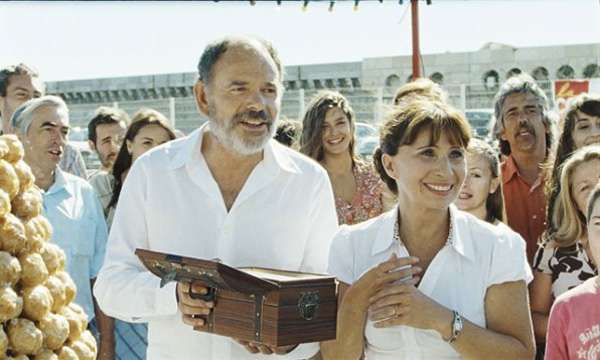 JEAN-PIERRE DARROUSSIN AND ARIANE ASCARIDE IN THE SNOWS OF KILIMANJAROTell what you know: Marseille, early-retired dock workers, and the social contract
JEAN-PIERRE DARROUSSIN AND ARIANE ASCARIDE IN THE SNOWS OF KILIMANJAROTell what you know: Marseille, early-retired dock workers, and the social contractThis is a film in which French Armenian filmmaker Robert Guédigian does what he does best: a warmly humanistic film about socio-economic issues. If the Dardenne brothers always made films using a cast of old friends and family and set them in the same warm Mediterranean setting, you'd get the Guédigian of
The Snows of Kilimanjaro. It's all a little too good to be true, but the filmmaker's working methods are so smooth and his regular cast members, many his friends, are so adept and so appealing the messages go down easy and warm the heart. The basic one: people's actions are explainable by social and economic causes and not due to moral or personality defects.
Michel and Marie-Claire (Jean-Pierre Daroussin and Ariane Ascaride) are "middle-class, but not completely," they agree. They live on the cusp between complacency and anger so they can see the possibility of either mood. They can sit on their balcony enjoying the sun in the late afternoon and they own the place where they live. But they know how hard it was to get there. Marie-Claire gave up nursing school years ago and takes care of an old lady and Jean was forced into early retirement from his dock worker job. A union rep himself, he conduced a drawing to lay a group of people off and put his own name in the box.
A big joyous party takes place to sweeten the pill Jean has chosen to swallow. It's so naturally and wonderfully staged (packed with the director's regulars and friends) that you wish you could be there. Present are Jean's coworkers and some of those laid off, Jean and Marie-Claire get a present: a box of cash, and tickets for a two-weak trip to Kenya. Also Jean's best buddy since childhood Raoul (Gérard Meylan) gives him a comic book he used to own that disappeared, the first one he every bought. The couple start getting ready for the trip. Jean, unwilling to learn the "colonial" language, English, starts studying Swahili.
Not long afterwards Jean, Marie-Claire, Raoul, and his wife Denise (Marilyne Canto) are having an evening of cards when a couple of young masked men break in with pistols, tie them up, and take the money from the party as well as the tickets and their credit cards. One of them goes off with the comic book. Denise is very traumatized. Jean gets knocked over and his shoulder gets injured.
One of the bad guys turns out to be one of the laid off guys. The way all this is resolved has policier elements, and also some intense speeches that explain opposing points of view. Because the filmmaker's working methods are so smooth and natural, it all goes down easy. Having recently seen only Guédiguian's noirish thriller
Lady Jane (
SFIFF 2008) and his WWII historical film about foreigners involved in the French resistance,
The Army of Crime (
Rendez-Vous 2010), which like this employs Grégoire Leprince-Ringuet, and it's been quite a while since I saw his social portrait
The Town Is Quiet (2000), I was not really aware of how winning the director is when working in every sense on his home turf. (But from French reviews, even they had tended to take him for granted and forget how "essential" he is.) There is a great deal of warmth here, a great many home truths, plenty to think about. It's almost as if Brecht were a real charmer, and his characters turned to you and gave you little lectures, but totally in character, as if they were not theatrical devices but real people really talking to you.
Christophe (Leprince-Ringuet) has two little brothers. Eventually Marie-Claire tracks down their mother, and she explains vociferously why she's left them in the 22-year-old now out-of-work Christophe's care. In a word: men. Nobody is wrong here. Even the police commissioner (played by the interesting Robinson Stévenin) who helps Jean with his problem is basically nice. As mentioned it's a little too good to be true; but it's not too good to be both enjoyable and instructive,
dulce et utile. This is an unusually a fine piece of committed cinema. Because the points made are straightforward and clear does not meant they aren't true. Probably the best made and most valuable film in the 2012 Rendez-Vous press screenings so far.
Les Neiges de Kilimanjaro debuted at Cannes May 2011, and opened in Paris November 16, when it was enthusiastically received by the capital's generally left-leaning critics (Allociné 4.1).
This film is included in the joint UniFrance-Film Society of Lincoln Center presentation series from March 1-11. Public screening schedule:
*Tues., March 6, 7:45pm – IFC; Thurs., March 8, 1:30pm – WRT; *Sat., March 10, 9pm – WRT
*In person: Jean-Pierre Darroussin




